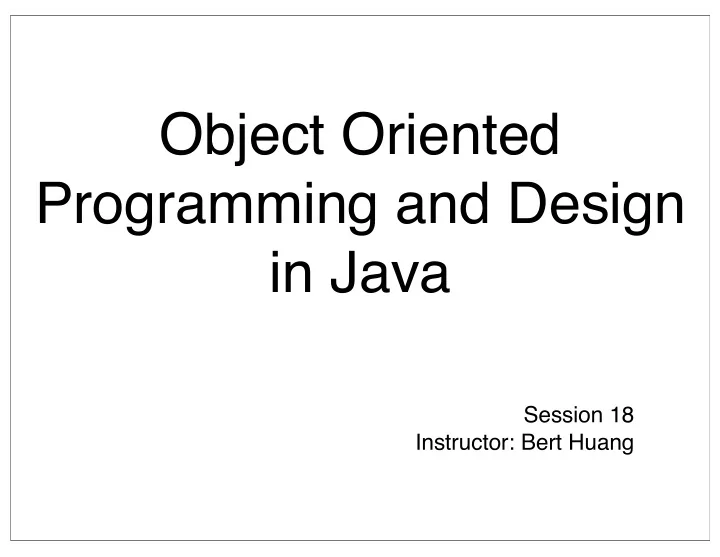

Object Oriented Programming and Design in Java Session 18 Instructor: Bert Huang
Announcements • Homework 4 due Mon. Apr. 19 • No multithreading in programming part • Final Exam Monday May 10, 9 AM - noon, 173 MACY (this room)
Review • Multithreading • Thread, Runnable • Handling Race conditions • Lock, Condition, synchronized • Producer Consumer
Today's Plan • Deadlocks and the Dining Philosophers Problem • More on Threads in Java • Thread, Runnable, Object javadoc • Keywords synchronized and volatile • ReentrantLock • Programming by contract and threads
Dining Philosophers
Dining Philosophers • Example of deadlock when threads need two or more locks (e.g., moving objects from list to list) • Each diner locks chopsticks then eats • leftChopstick.lock() rightChopstick.lock() eat() rightChopstick.unlock() leftChopstick.unlock()
Dining Philosophers
Dining Philosophers
First Problem: Starvation • Since we don ʼ t know how OS will schedule threads, two diners may never get to eat • ReentrantLock has a fairness flag that makes sure locks are granted first- come-first-served • new ReentrantLock(true);
Second Problem: Deadlock • If all diner threads start simultaneously, we can get stuck in a deadlock • Each philosopher locks his left chopstick, waits for right chopstick • Even if we use conditions and release the chopsticks, we could have livelock • Infinite loop of simultaneously locking and releasing the left chopsticks
Dining Philosophers
Two Deadlock Solutions • Order the chopsticks; locks must be acquired in the same order • No circular deadlock, but now some threads have higher priority • Require master lock to lock any chopsticks • master.lock() leftChopstick.lock(); rightChopstick.lock(); master.unlock(); eat() leftChopstick.unlock(); rightChopstick.unlock()
Thread States Reasons for block: Sleep Waiting for I/O Waiting to acquire lock Waiting for condition
Thread (abridged) • void join() - Waits for this thread to die • static void sleep(long millis) - Causes the currently executing thread to sleep (temporarily cease execution) for the specified number of milliseconds, subject to the precision and accuracy of system timers and schedulers. • void start() - Causes this thread to begin execution; the Java Virtual Machine calls the run method of this thread. • static void yield() - Causes the currently executing thread object to temporarily pause and allow other threads to execute.
Runnable
Object
synchronized • Methods with keyword synchronized automatically lock the containing object when called • We can explicitly acquire the object lock synchronized(objectToLock) { ... } • This allows us to use unsafe objects safely synchronized(myArrayList) { myArrayList.add(i); }
Volatile Fields • A misunderstood method to make synchronize threads is to declare fields with keyword volatile • volatile guarantees that the field is never cached by a thread • whereas nonvolatile fields may be copied in other threads by compiler optimizations • volatile will not help synchronization when the problems come from multiple operations
ReentrantLock • Allows multiple lock acquisitions by a single thread • Thread that owns it may call lock() again many times myLock.lock(); // acquires ownership of myLock myLock.lock(); // acquires a 2nd lock on myLock • ReentrantLock will not unlock until unlock() is called the same number of times myLock.unlock(); // releases the 2nd lock myLock.unlock(); // releases the original lock
Recursive Locks • Recursive locks are controversial • They encourage code that allows threads to hold onto locks longer • Locks stop concurrency • But they help preserve encapsulation and abstraction: • you can make recursive calls without having each call know about the state of the lock
Threads and Invariants • We prove class invariants by showing that the invariant is true when all methods finish • Multithreading allows interaction before methods finish • Preserve invariants by locking around blocks of code where the invariant may not be true • e.g., A[size] is the next empty slot of the array
Threads and Preconditions • A precondition that is true when a method is called may not be true when the relevant logic is executed • Preserve the precondition by locking the objects involved at method call • maybe too restrictive
Multithreading • Multithreading is small-scale parallel computing, i.e. , a practice ground for the future of computing • Relatively new challenge in software design; multicore only popularized recently in consumer machines • Encapsulation, good OOP are still major challenges, • e.g., a synchronized, threadsafe ArrayList may lock too much for some applications
Reading • Horstmann Ch. 9
Recommend
More recommend